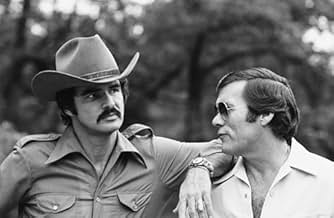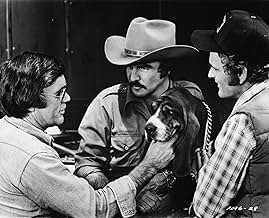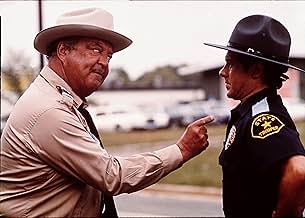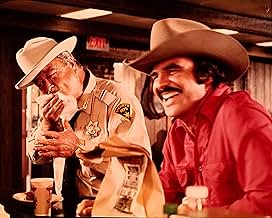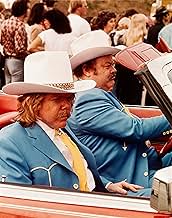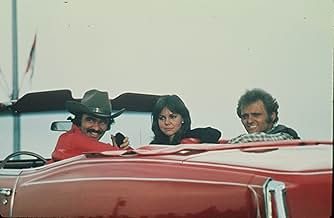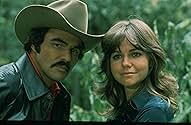Der Trucker Bandit wird angeheuert, eine Ladung Bier über die Staatsgrenze zu fahren, verfolgt von einem nervtötenden Sheriff.Der Trucker Bandit wird angeheuert, eine Ladung Bier über die Staatsgrenze zu fahren, verfolgt von einem nervtötenden Sheriff.Der Trucker Bandit wird angeheuert, eine Ladung Bier über die Staatsgrenze zu fahren, verfolgt von einem nervtötenden Sheriff.
- Für 1 Oscar nominiert
- 3 Nominierungen insgesamt
Susie Ewing
- Hot Pants
- (as Susan McIver)
Laura Lizer Sommers
- Little Beaver
- (as Laura Lizer)
Bruce Atkins
- Man Little Enos Pays Off
- (Nicht genannt)
Handlung
WUSSTEST DU SCHON:
- WissenswertesHal Needham asked Jerry Reed to write a theme song for the film. A couple of hours later, Reed presented "East Bound and Down" to Needham. With an acoustic guitar, Reed started to play it and Needham immediately stopped him. Thinking Needham didn't like it, Reed offered to re-write the song. To which Needham replied: "If you change one note, I'll kill you!" The song went on to become one of Reed's biggest hits.
- PatzerWhen the police car at the road block is knocked off the embankment, the car seen rolling down towards the river is a late-'60s Ford Galaxy, but when it comes to rest at the bottom, it is a Plymouth Fury.
- Zitate
Buford T. Justice: [to his son] There's no way, *no* way, that you came from *my* loins. Soon as I get home, first thing I'm gonna do is punch yo' momma in da mouth!
- Alternative VersionenThe TV print needed extensive overdubbing to reduce the amount of profanity. In particular, Jackie Gleason's expression "Sum-bitch!" was replaced with "Scum-bum." This new word became a popular catch phrase with kids after the film made its TV debut.
- VerbindungenFeatured in Hollywood: The Gift of Laughter (1982)
Ausgewählte Rezension
"Snowman what's your 20, you got your ears on, comeback? We got a Smokey convoy on our tail moving eastbound and down, with the peddle to the metal and the thing to the floor". If any of that makes sense to you it means one of two things. Either you were a young male in the late seventies who dressed in cowboy boots and drove a trans-am... or you have seen the film Smokey and the Bandit.
Smokey sees classically trained thespian Burtrand Reynolds essay the role of the Bandit, a mythical, almost Quixotesque figure, who cuts across the American landscape in a black Pontiac firebird, the ultimate phallic representation of male dominance. The densely layered plot sees Bandit become involved in a quest of Arthurian proportions, attempting to do "what they say can't be done". As it goes, there's a drought in old Atlanta, and the fine townsfolk are gagging for some liquid refreshment for the upcoming monster-truck derby. Luckily, Bandit hears that there's beer in Texarkana, and sets out across country to bring it back... no matter what it takes.
Director Hal Needham, surely an auteur of Hitchcockian proportions, keeps the first act moving along at a steady pace, and there is always close attention paid to characterisation. However, it is in act two that things really get interesting, for no sooner has the Bandit and his ever-faithful slave... sorry, sidekick Snowman loaded up the truck with the brew... than they are set upon by a runaway bride (Sally Field), a fleet of southern law enforcers, and the formidable Sheriff Bufred T. Justice (Jackie Gleason), whose catchphrase "that sun' bitch" proved to be as lastingly funny as a dose of the clap. From this point on tension is cranked to eleven, with more jaw-dropping moments than the entire Indian Jones series combined. Don't believe me, take the scene where Bandit attempts to jump the bridge... if this doesn't have you standing on your seat screaming "go bandit go... yee-haw", then quite frankly nothing will.
Bandit is one no-nonsense jive-talker, an enduring character whose down with the kids (and the blacks), making him one fine example of a true southern gent. We never doubt our hero will fail at his mission, especially not with the benefit of hindsight, since Bandit managed to evade the law and return for the imaginatively titled Smokey and the Bandit II. Here his bounty was an African elephant that, understandably, had the hots for the moustachioed one. Then there was the third instalment, which had a script so bad Reynolds himself turned it down. Here the sh*t-kickers formula was repeated... just without the kick. Smokey and the Bandit is, admittedly, not high art. It's not even low art. But it does represent some kind of period piece, a history lesson, or the pinnacle of late seventies cinema.
Your enjoyment of the film depends on your first viewing experience. If like myself, you were a young boy growing up in the mid-eighties, you will have no doubt lived for the endless thrills, spills, car crashes and second-rate jokes that pepper Bandit, and its two sequels. It's easy to laugh at now, and a young audience will probably be left scratching their heads at the sight of Burt Reynolds mugging uncontrollably to the camera for ninety-minutes whilst Jerry Reed gets to 'sing' his good ol' boy theme tune 'East-bound and Down' for the one-millionth time, but there is a perverse pleasure in seeing bell-bottoms, grown men with CB radios and muscles cars the size of small houses, the likes of which most people won't have seen since 1982. 3/5
Smokey sees classically trained thespian Burtrand Reynolds essay the role of the Bandit, a mythical, almost Quixotesque figure, who cuts across the American landscape in a black Pontiac firebird, the ultimate phallic representation of male dominance. The densely layered plot sees Bandit become involved in a quest of Arthurian proportions, attempting to do "what they say can't be done". As it goes, there's a drought in old Atlanta, and the fine townsfolk are gagging for some liquid refreshment for the upcoming monster-truck derby. Luckily, Bandit hears that there's beer in Texarkana, and sets out across country to bring it back... no matter what it takes.
Director Hal Needham, surely an auteur of Hitchcockian proportions, keeps the first act moving along at a steady pace, and there is always close attention paid to characterisation. However, it is in act two that things really get interesting, for no sooner has the Bandit and his ever-faithful slave... sorry, sidekick Snowman loaded up the truck with the brew... than they are set upon by a runaway bride (Sally Field), a fleet of southern law enforcers, and the formidable Sheriff Bufred T. Justice (Jackie Gleason), whose catchphrase "that sun' bitch" proved to be as lastingly funny as a dose of the clap. From this point on tension is cranked to eleven, with more jaw-dropping moments than the entire Indian Jones series combined. Don't believe me, take the scene where Bandit attempts to jump the bridge... if this doesn't have you standing on your seat screaming "go bandit go... yee-haw", then quite frankly nothing will.
Bandit is one no-nonsense jive-talker, an enduring character whose down with the kids (and the blacks), making him one fine example of a true southern gent. We never doubt our hero will fail at his mission, especially not with the benefit of hindsight, since Bandit managed to evade the law and return for the imaginatively titled Smokey and the Bandit II. Here his bounty was an African elephant that, understandably, had the hots for the moustachioed one. Then there was the third instalment, which had a script so bad Reynolds himself turned it down. Here the sh*t-kickers formula was repeated... just without the kick. Smokey and the Bandit is, admittedly, not high art. It's not even low art. But it does represent some kind of period piece, a history lesson, or the pinnacle of late seventies cinema.
Your enjoyment of the film depends on your first viewing experience. If like myself, you were a young boy growing up in the mid-eighties, you will have no doubt lived for the endless thrills, spills, car crashes and second-rate jokes that pepper Bandit, and its two sequels. It's easy to laugh at now, and a young audience will probably be left scratching their heads at the sight of Burt Reynolds mugging uncontrollably to the camera for ninety-minutes whilst Jerry Reed gets to 'sing' his good ol' boy theme tune 'East-bound and Down' for the one-millionth time, but there is a perverse pleasure in seeing bell-bottoms, grown men with CB radios and muscles cars the size of small houses, the likes of which most people won't have seen since 1982. 3/5
Top-Auswahl
Melde dich zum Bewerten an und greife auf die Watchlist für personalisierte Empfehlungen zu.
Details
- Erscheinungsdatum
- Herkunftsland
- Offizielle Standorte
- Sprache
- Auch bekannt als
- 2 pícaros con suerte
- Drehorte
- Produktionsfirmen
- Weitere beteiligte Unternehmen bei IMDbPro anzeigen
Box Office
- Budget
- 4.300.000 $ (geschätzt)
- Bruttoertrag in den USA und Kanada
- 126.737.428 $
- Weltweiter Bruttoertrag
- 126.750.426 $
- Laufzeit1 Stunde 36 Minuten
- Farbe
- Sound-Mix
- Seitenverhältnis
- 1.85 : 1
Zu dieser Seite beitragen
Bearbeitung vorschlagen oder fehlenden Inhalt hinzufügen

Oberste Lücke
By what name was Ein ausgekochtes Schlitzohr (1977) officially released in India in English?
Antwort

